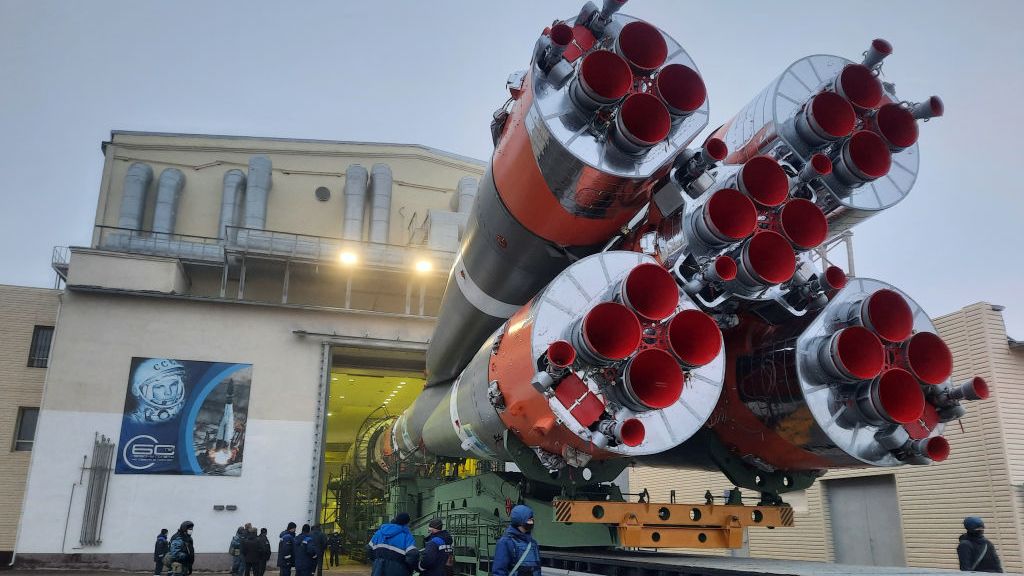OneWeb suspends satellite launch from Russian spaceport
The decision follows Roscosmos’ demand that the UK sell its 20% stake in OneWeb purchased in 2020


Sign up today and you will receive a free copy of our Future Focus 2025 report - the leading guidance on AI, cybersecurity and other IT challenges as per 700+ senior executives
You are now subscribed
Your newsletter sign-up was successful
OneWeb has suspended its plans to launch 36 broadband satellites from a Russian-operated spaceport in Kazakhstan, which were due to launch on Friday, 4 March.
The decision comes one day before the scheduled launch, which was part of OneWeb’s effort to provide “high-speed, low-latency global connectivity”.
The launch was to be overseen by the Russian space agency Roscosmos, involving Russian-made Soyuz rockets.
In a brief statement, the UK government-backed network satellite company said its board members “voted to suspend all launches from Baikonur" – the Russian launch site that has also been previously used for Soviet space missions.
The decision follows Roscosmos’ demands that the UK government sell its 20% stake in OneWeb, purchased in 2020.
According to Roscosmos head Dmitry Rogozin, this would guarantee that the OneWeb satellites launched in Kazakhstan wouldn’t be used for the UK government’s military purposes.
Rogozin had given OneWeb a deadline of 9:30 PM on 4 March to comply with Roscosmos’ demands – a little over one hour before the satellites were scheduled to be launched into space at 10:41 PM GMT.
Sign up today and you will receive a free copy of our Future Focus 2025 report - the leading guidance on AI, cybersecurity and other IT challenges as per 700+ senior executives
The UK government refused to sell its shares, with business secretary Kwasi Kwarteng stating that “there's no negotiation on OneWeb” and that the UK government is “in touch with other shareholders to discuss next steps”.
“In light of Russia’s illegal and unprovoked invasion of Ukraine, we are reviewing our participation in all further projects involving Russian collaboration,” he added.
RELATED RESOURCE

The Total Economic Impact™ of IBM Cloud Pak® for Watson AIOps with Instana
Cost savings and business benefits
The purchase of the government-owned OneWeb shares was signed off by prime minister Boris Johnson and chancellor Rishi Sunak in June 2020, months after the satellite company filed for bankruptcy in the US.
The deal, estimated to be worth between £400 and £500 million of taxpayers’ money, was heavily criticised due to the lack of adequate technology provided by OneWeb, as the UK sought a post-Brexit replacement for the EU’s Galileo satellite navigation system.
It was also seen as symptomatic of politicians’ lack of tech knowledge and isolationist agenda by investing in a flailing company primarily due to the fact that it is based in the UK.
At just 1,200km above sea level, OneWeb’s 74 satellites are situated too low on the Earth’s orbit to provide the UK with the appropriate signal. In comparison, the EU’s Galileo system is located approximately 23,222km above land.
Having only graduated from City University in 2019, Sabina has already demonstrated her abilities as a keen writer and effective journalist. Currently a content writer for Drapers, Sabina spent a number of years writing for ITPro, specialising in networking and telecommunications, as well as charting the efforts of technology companies to improve their inclusion and diversity strategies, a topic close to her heart.
Sabina has also held a number of editorial roles at Harper's Bazaar, Cube Collective, and HighClouds.
-
 Anthropic promises ‘Opus-level’ reasoning with new Claude Sonnet 4.6 model
Anthropic promises ‘Opus-level’ reasoning with new Claude Sonnet 4.6 modelNews The latest addition to the Claude family is explicitly intended to power AI agents, with pricing and capabilities designed to attract enterprise attention
-
 Researchers call on password managers to beef up defenses
Researchers call on password managers to beef up defensesNews Analysts at ETH Zurich called for cryptographic standard improvements after a host of password managers were found lacking
-
 A strategic approach to security: Intelligent, collaborative, and efficient
A strategic approach to security: Intelligent, collaborative, and efficientwhitepaper How your security fabric can address the challenges of new tech investment
-
 Anticipate, prevent, and minimize the impact of business disruptions
Anticipate, prevent, and minimize the impact of business disruptionsWhitepaper Nine best practices for building operational resilience
-
 Thwart cyberthreats fast with security operations + AI Ops
Thwart cyberthreats fast with security operations + AI OpsWhitepaper How automated collaboration saves the day
-
 Three steps to transforming security operations
Three steps to transforming security operationsWhitepaper How to be more agile, effective, collaborative, and scalable
-
 Top ten ways to anticipate, eliminate, and defeat cyber threats like a boss
Top ten ways to anticipate, eliminate, and defeat cyber threats like a bossWhitepaper Improve your cyber resilience and vulnerability management while speeding up response times
-
 Automation antidotes for the top poisons in cyber security management
Automation antidotes for the top poisons in cyber security managementWhitepaper How orchestration and collaboration tools can provide a healthy defense against the most serious threats
-
 A prudent approach to major security incidents
A prudent approach to major security incidentsWhitepaper Establish an effective strategy across four phases
-
 Cybercriminals are resilient. How about you?
Cybercriminals are resilient. How about you?Whitepaper Stay ahead of those agile bad actors
